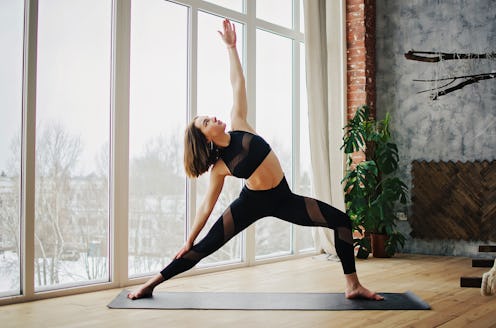(Living)
Why You Should Be Changing Your Workout Every Week

It's easy to fall into a rut with anything you like or feel comfortable with — whether that be with the foods you eat or your regularly scheduled programming. But, every now and then, it really pays to switch things up, and such is the case with your fitness routine. As it turns out, changing your workout every week has benefits you probably don't even realize.
Besides saving you from boredom at the gym, as well as rotating what muscle groups you're exhausting, having some variety in your workouts has a powerful effect on your body from the inside out — and that's because of the role movement can play with your hormone levels. As a wellness specialist and founder of Soul Wellness Method, Shauna Faulisi, has seen firsthand how important this connection is. "Hormones are extremely powerful and we might as well learn from them instead of trying to fight them because we’ll never win," she says. "This is perhaps one of the most important aspects to why changing one's workout is crucial."
Fausili follows WomanCode author Alisa Vitti's method of "cycle syncing," in other words, adapting diet, exercise, and lifestyle habits to the changes in your menstrual cycle. And just like highlighting (seed cycling for example) or avoiding certain foods can help with PMS symptoms including breakouts, abdominal cramps, breast tenderness, and the list goes on, listening your your body's movement needs at certain points of your cycle can do the same. That said, trying the latest fitness craze may not benefit you as much if it's not making you feel good.
"There’s currently an overload of one-size-fits-all fitness imagery on the internet that’s creating vast confusions while breeding anxiety and comparison," the expert explains. "But we all come from different backgrounds, different lineages, we have different stress levels, different support systems, and we're all ever-changing." And the different phases of your cycle perfectly exemplifies this. "One of the easiest and most beneficial way for women to figure out what workouts work best for them is to take a look at their menstrual cycle," she adds.
The different phases include: menstrual (the actual duration of menstrual bleeding), follicular (approximately one week following the menstrual cycle), ovulation (the week when you're most fertile), and luteal (the two-week period that follows ovulation and typically produces progesterone). Following Vitti's theory, depending on where you are on this spectrum, you may want to vary between high intensity workouts — like HIIT workouts or boxing — to lower impact ones such as yoga and pilates as well as good old-fashioned rest. During the menstrual phase, it may benefit you to give yourself a break. "We recommend taking the first few days off of anything vigorous," offers Faulisi. "Get extra sleep, go for walks, pop into a restorative yoga or yin-yoga class, or do some at-home stretching." Moving into your follicular phase, your increase in energy means you can bump up your workouts a bit. "We're primed for more intense cardiovascular workouts like HIIT and heavy weights, and have a higher pain tolerance," she adds.
During ovulation, your estrogen levels are at a high, so you may be more social and and physically strong, which is why it could be a great time to try more strenuous workouts, like weight-training, spin class, or dancing, as Faulisi recommends. When your luteal phase rolls around, you may notice you have a lower pain tolerance and high water retention, which could be benefitted by lower impact workouts or activities that can activate your lymphatic drainage. "Hiking, walking, and non-heated yoga are perfect for this time," she says.
Adapting your workout to your cycle also doesn't mean you have to skip out on the latest fitness fad necessarily. As Faulisi explains, it's all about listening to what your body wants and its changing needs. "Clients ask me all the time about the latest Instagrammable workout and if they should be doing it," she says. "My answer is always the same: Does it excite you? Do you feel called to do that? Would it make you feel good?" And if that happens to mean taking a few days off to chill with a heating pad and your favorite shows, that's all a part of the plan, too.